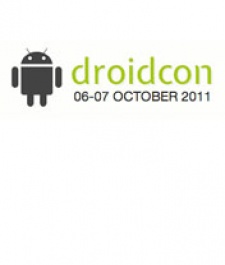Tucked away in a corner of the Business Design Centre in London, the Droidcon 2011 conference was all about highlighting areas of current concern to Android developers.
Combined with this was the opportunity to meet up with service providers such as mobile advertising networks and the like, and there was also time for advice about gaming - amongst other coding and design tricks - in the three demonstration areas.
Games certainly weren't a focus of the show; still, walk a few metres into the busy main hall where businesses such as Accenture had their stands, and you would have been hard-pressed to not hear a developer talking of games be that a 'little side project', a full-blown emulation of the BBC Micro, or Sony Ericsson's Xperia Play demonstration.
Yet there was another word on everyones lips, one that constantly cropped up in the few gaming-focused presentations, sometimes at the expense of Android itself iPhone.
The elePhone in the room
Indeed, the two entertaining back-to-back case studies presented by Mustafa Isik (coder and former games journalist) and Yosi Taguri (developer of Pah!) seemed reluctant to mention Android at all.
The former heaped praise on Valve's Steam and Apple's App Store for redressing consumers' fears over non-physical distribution, while the latter focused almost entirely on the original iPhone version of the game and its journey from eight hour programming competition to global success.
In what has become a depressingly familiar story, Android's appearance in Taguri's talk only served to demonstrate the lack of money that version had made, with the percentage of the $60,000 revenue from direct sales to consumers sitting at just 1 per cent.
However, while others have been quick to point the finger at piracy rates for this imbalance, Yosi went against the grain by calling it 'cool', saying that he believed it helped spread the word about the game on sites such as YouTube, encouraging further sales.
Android and BlackBerry
One talk where Android was firmly the centre of attention (albeit not in an overly positive way) was on security in enterprise, although it must be noted that Alan Goode of Goode Intelligence didn't give iOS a clean bill of health either.
But while praise was being heaped on RIM and the way its BlackBerry range of phones offers more security for businesses, RIM itself was busy downstairs pitching to Android developers in the hope of luring a few apps over to the PlayBook via its Android wrapper.
The developer relations representative for RIM that I spoke to (who wished to remain anonymous) was cagey when questioned about whether this would mean fewer developers taking up native programming for QNX.
However, the fact the PlayBook tablet supports four separate programming languages (including C++ and HTML5) for app creation, and RIM was publicly courting Android apps at the event, suggests it isn't too precious about getting exclusive, native apps for its under-populated BlackBerry App World service.
Shake your un-moneymaker
The overriding theme I came away with from the conference was predictable - how do you make money with Android?
It's literally the million dollar question, with a number of companies such as Tapjoy and Papaya attempting to woo developers with advertising, monetisation and social engagement, while others such as Bluevie floated the idea of carrier partnership through its billing system and ties.
But despite some strong presentations from all three companies, no one option seemed to offer a silver bullet solution.
Making it easy to integrate these services with specialised and powerful APIs is a start, and the freemium revenue works well for certain publishers - those with massive scale - but until an Android developer gets up on stage and presents a talk where the success is because of the format, not in spite of it, the question remains unanswered.
Why Apple and RIM were the big news at London Android show Droidcon 2011
Sitting in your rivals' shadow





















